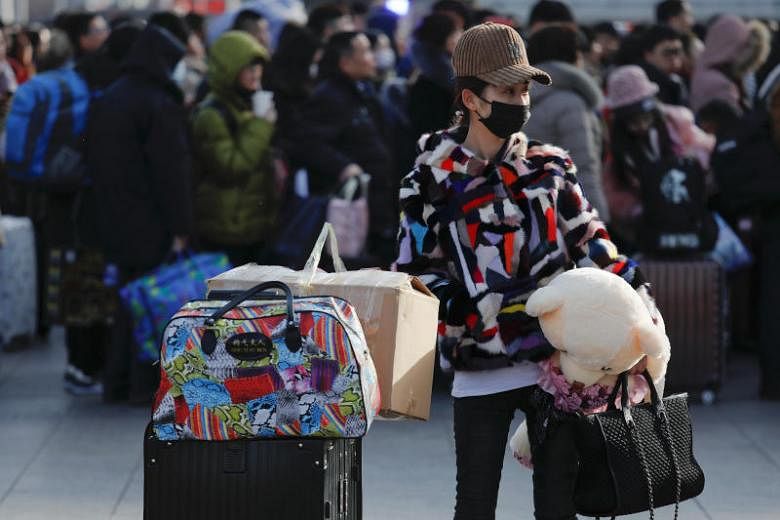BEIJING (CHINA DAILY/ASIA NEWS NETWORK) - China on Thursday (Feb 1) kicked off the world's largest annual human migration with the start of the 40-day Spring Festival travel rush, also known as chunyun.
During this period, hundreds of millions of Chinese cram onto trains, buses, planes and boats to return to their hometowns for Chinese New Year, or use the week-long Spring Festival holiday for travel.
About 2.98 billion trips are expected to be made between Feb 1 and March 12.
The figure is basically the same as that of last year, said Lian Weiliang, deputy director of the National Development and Reform Commission (NDRC), at a news conference on Wednesday (Jan 31).
Road trips via long-distance buses remains the most common mode of transport for most Chinese, with eight in 10 travellers taking the coach home this year.
This year, however, such trips are expected to dip for the first time as the country's high-speed rail network continues to expand and more people chose to drive home, authorities said.
The number of road trips is projected to reach 2.48 billion, a 1.6-per-cent decrease from last year, while train trips are likely to top 390 million, up 8.8 per-cent year on year, the NDRC said in an earlier statement.
Air travel will likely top 65 million trips, a 10-per-cent increase from last year, while boat trips are predicted to reach 46 million during the period.
The decline of bus trips is expected to occur thanks to the rapid development of high-speed rail and airline service.
More people have changed to trains and planes to get home, according to a statement from the Ministry of Transport.
"The extension of China's expressways and the continued increase of using private cars has also greatly relieved public road transportation, as many have chosen to drive home and visit relatives and tourist attractions during the Spring Festival Holiday," the statement said.
According to the Ministry of Public Security, the number of cars in China reached 217 million by the end of last year (2017).
"The country has seen the number of small vehicles on its expressways increase by 14 per cent year-on-year last year. Similar growth is expected on the expressways across the country during the Spring Festival travel rush," it said.
Spring Festival, or Chinese New Year, falls on Feb 16 and Feb 17 this year. The week-long Spring Festival holiday starts on Feb 15.
"Around 3 billion trips during the 40 days will be a big test for the country's transportation departments," said Liu Xiaoming, an official with the Ministry of Transportation. That's equivalent to 40 per cent of the world's population.
The freezing weather in many parts of China has posed more challenges for the authorities.
China's national observatory maintained its blue alert on Tuesday (Jan 30), after a cold front hit parts of central and east China.
Railway and airport staff has been removing snow and ice from roads to ensure passenger safety during travel.
An additional 177 high-speed train services will be put into service to carry 100,000 more passengers each day during the travel rush, according to Li Wenxin from China Railway Corporation.
China's railway network hit 127,000 km in length at the end of 2017, including 25,000 km of high-speed railway.
Last year, 3,038 km of new rail tracks were put into production, which Li said would further reduce pressure on other forms of public transportation.
To facilitate quicker check-in and ease congestion at train stations, some railway stations have started since last year to use facial recognition technology to verify passenger identities.
At the same time, the aviation authority plans to schedule 30,000 more flights during the travel rush, said Wang Zhiqing, deputy head of the Civil Aviation Administration.
Data from Chinese ride-hailing giant Didi Chuxing shows that car-sharing services will be a hit during this year's travel rush.
A total of 33 million people will use ride-sharing services to get home this year, three times the total of the previous two years, according to the company.
Huang Jieli, head of carpooling services at Didi, said the company has seen a year-on-year increase of 10 per cent for trips home using the company's car-sharing services.

